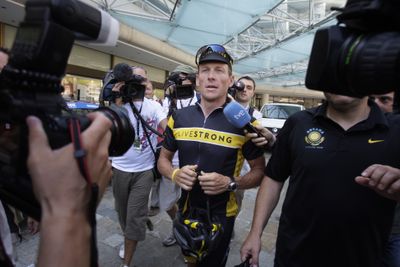Armistice for Armstrong
French thaw attitude toward U.S. cyclist

MONACO – For all of Lance Armstrong’s Tour de France victories, he still hasn’t won the hearts of the French. That may be about to change.
“A lot has been made about that relationship between them and myself,” he told the Associated Press by phone this week. “The comments are not necessarily in line with reality.”
Armstrong is awaiting his first Tour since 2005. The 37-year-old Texan often put off the French during his seven straight titles with a self-confidence seen as arrogance, and an unapologetic crushing of rivals that seemed to drain the race of the suspense the fans crave.
There are signs, though, that the hostility Armstrong was greeted by in some previous races will be absent this time.
A poll published in Thursday’s edition of L’Equipe showed 72 percent of respondents said they were “not bothered” by Armstrong’s presence on this year’s Tour.
The race starts Saturday in Monaco. On Thursday, cycling governing body UCI carried out prerace blood tests of all the expected riders as part of a tough new anti-doping program, and the 20 teams were presented in a ceremony at the principality’s port.
Armstrong, in brief comments to a French TV reporter at the presentation, said he felt “a lot of excitement” and “a heckuva lot of nerves” before the three-week jaunt over nearly 2,140 miles.
Hundreds of fans cheered when the Texan and his Astana teammates were presented before the fans Thursday.
In the AP interview, Armstrong said he has also noticed a warmer reception this year.
He said he never received any negative comment during his prerace preparations, when he spent four days in the Alps previewing the mountain stages.
“And I have seen thousands stopping on the side of the road,” Armstrong said. “People were cool. Of course, there is going to be somebody that is not happy. But there are probably people in your neighborhood that are not happy with you either.”
As recently as November, a few weeks after Armstrong announced his comeback, there were tensions on both sides. Armstrong even suggested his safety might be at risk if he entered the Tour.
“If they hate you and you’re on the roads and they want you, they can get you,” he said then.
Bernard Hinault, five-time Tour de France winner and the last Frenchman to have won the race, recently blasted Armstrong for those comments.
“I hope he will not be there,” he said. “Is he afraid of France? Nobody forced him to come. He only has to stay home! He cannot win the Tour. I hope that (Alberto) Contador gives him a beating.”
Over the years, many in France harbored doubts that the cancer survivor raced clean, when so many other riders were caught doping. During his final Tour in 2005, many fans booed Armstrong as he raced by, and he subsequently stopped any visible effort to seduce the French.
During his absence, things have eased and Armstrong is not the same dominant rider anymore. He won only one race this season – the Nevada City Classic in June – and finished 12th in the Giro d’Italia. He also crashed and broke his collarbone in the Vuelta of Castilla and Leon stage race in March.
Armstrong will be on the starting line in Monaco in a situation he has never experienced. The man once feared as “the Boss” of the peloton is now a secondary rider to his Astana teammate Contador, the overwhelming prerace favorite, though anything can happen during the Tour.
But in his more mellow state, even some competitors are warming to the veteran.
“They (the riders) know I’m older, they see that I’m more relaxed,” Armstrong said. “Before, I never had riders asking for pictures or signatures. Now that happens. It’s pretty interesting.”
“They see that I’m not as intense as I was before. In the last couple of years, no rider even tried to talk to me and the team,” he said. “They were afraid to talk to us. Now we can have a conversation – it’s more open.”
French sports fans traditionally pull for the underdog or have affection for “the magnificent loser,” as the term goes in French – and Armstrong has never fit either label.
Take perennial runner-up Raymond Poulidor of France, who finished on the Tour podium eight times but never won, and never wore the race leader’s yellow jersey. Decades after his career ended, he is still worshipped by French fans.
For Armstrong, who wore the yellow jersey 83 days, he may not be as the golden years may be over, but time for reconciliation with the French may be close.
“The reactions that I have in hotels, the reactions that I have in training, the reactions that I have in restaurants, or anything, it’s a comfortable relationship,” he said. “I’m not worried about it.”